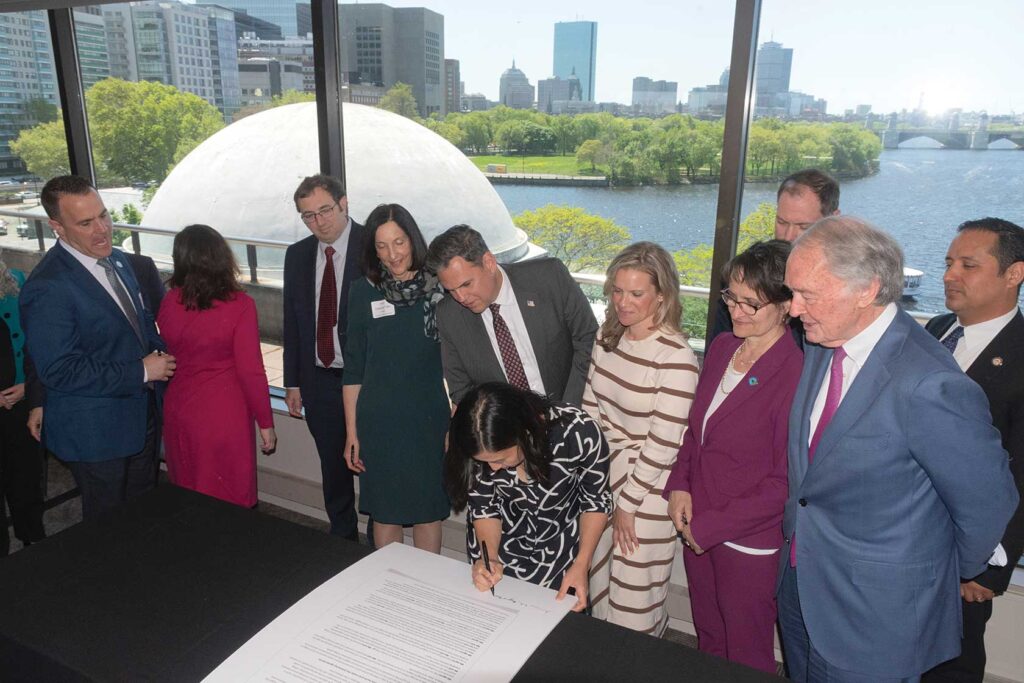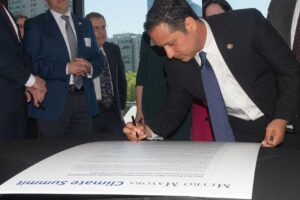Metro Boston municipal leaders sign new climate commitment amid Trump rollbacks

Since the start of the second Trump administration in January, climate and resilience efforts have seen funding cuts hamper progress. Rollbacks of environmental regulations have reduced protections limiting emissions from power plants and vehicles, as well as water and air quality standards. A federal push against diversity, equity and inclusion has targeted environmental justice efforts to balance environmental harms and benefits across the country.
But, from a room at the Boston Museum of Science, with wide windows looking out over the Charles River and beyond to the banks of Boston and Cambridge, mayors and town and city managers from across the metro Boston area came together, May 12, to renew a commitment to continuing to address climate change — and to do it together.
“The Atlantic Ocean does not pay any attention to municipal boundaries, neither do most of our rivers and certainly our atmosphere doesn’t,” said Marc Draisen, executive director of the Metropolitan Area Planning Council, which helped organize the Metro Mayors Climate Taskforce. “So, while we have to pay attention to those boundaries, we also have to speak and shake hands and take action across those borders.”
The event was this year’s Metro Mayors Climate Summit, a gathering of 17 municipal leaders from communities from Lynn at the northern end to Braintree at the south and as far west as Newton.
The cornerstone of the summit was the signing of a climate commitment, re-upping an agreement made by the group of municipal leaders 10 years ago.
In 2015, the Metro Mayors Climate Task Force gathered to collectively sign a regional climate commitment with six commitments, including sharing best practices, aligning action, and integrating climate preparedness into municipal actions.
The new agreement, signed at the summit, advanced new commitments. These ones target more particular efforts — steps like supporting the siting of clean energy, funding resilience efforts at vulnerable infrastructure points, and addressing emissions from buildings and transportation, which are the two largest emitting sectors, according to state data.
Environmental justice and goals to help the state’s populations more vulnerable to the impacts of climate change are centered on those efforts.
Those kinds of regional initiatives include, for example, projects like Wicked Hot, an initiative along the Mystic River that looked at temperature disparities throughout that watershed, which demonstrated that previously redlined neighborhoods were, on average, 4 degrees hotter than non-redlined ones.
That effort has now led to a regional cooling project that targets innovative cooling solutions that also respond to different municipal needs.
The agreements to work together are especially important in response to a federal administration under President Donald Trump that has pulled back on climate action and protections, speakers said.
“I think MAPC is exactly the kind of institution that communities need for preparing for a changing climate right now, … particularly in a moment when we no longer can count on the federal policies and support that we saw in the previous administration,” said David Sittenfield, director of the Museum of Science’s Center for the Environment, citing uncertain budgets that cities and towns now face when it comes to climate and resilience efforts.
Those pullbacks have included steps that have slowed or halted local environmental and resilience projects.

Chelsea City Manager Fidel Maltez signs the Greater Boston Metropolitan Mayors Climate Commitment. PHOTO: AVERY BLEICHFELD
For example, on the border of Chelsea and Everett, at the Island End River, a series of joint measures between the two cities was slated to build a storm wall and refresh a park space with a revitalized salt marsh to improve coastal resilience.
The $120 million project is intended to create protection for the nearby New England Produce Center, the hub of fruit and vegetable distribution for all of New England and up into Canada, as well as transportation and health care infrastructure, a high school and the homes of about 5,000 residents.
In April, the Federal Emergency Management Agency scrapped its Building Resilient Infrastructure and Communities program, pulling back on $50 million that had been awarded to the Island End project for construction costs.
In its statement announcing the end of the grants, FEMA called the program “politicized” and “wasteful and ineffective.” That grant program was launched by Trump’s first administration in September 2020.
But local leaders said the program — and the funding it would have provided to the Island End project and other metro Boston resilience efforts — is important to get ahead of future climate impacts.
“We want to respond to crises that are going to come in the future, not spend a lot of money on response to flooding, on response to damage,” said Fidel Maltez, city manager for the city of Chelsea.
Without the federal funds for construction, Maltez said the project may not be able to progress for now.
The effort has been highlighted as having a regional impact, both due to the significance of the New England Produce Center and its role in closing flood pathways in concert with other projects along the Mystic River.
“We’ve gotten a lot of tough news when it comes to federal funding over recent months, but that was the one that really hurt,” said Katherine Antos, undersecretary of decarbonization and resilience at the state Executive Office of Energy and Environmental Affairs, who signed a letter of support for the project when she previously served as deputy executive director for planning and sustainability at MAPC.
The end of the BRIC grant program meant the loss of over $84.8 million for projects in the metro area, along with another $3.4 million for statewide efforts.
Leaders at the summit also spoke out against what they called a move away from science in Trump’s Environmental Protection Agency.
“Wouldn’t it be a better system if we simply stopped all our science, our research, our testing, our analysis, and just proceeded blind in the dark — which seems to be, unfortunately, the way we are going on the federal level,” said Marc Draisen, executive director at MAPC.
As part of an organizational restructuring, the EPA has announced plans to shut down its Office of Research and Development — its scientific research arm. Lee Zelden, the agency’s director, has said the move intends to incorporate its scientists directly into program offices, but reporting from the journal Nature found that, according to internal emails, the restructuring has included cuts in funding for long-term projects and the closure of ORD labs.
The EPA has also ordered staff to begin canceling research grants, and Chemical and Engineering News reported that, as of May 2, ORD scientists were given a week to apply for a new job in the agency or accept early retirement.
But local leadership in climate work isn’t new, said Rebecca Tepper, secretary of the Executive Office of Energy and Environmental Affairs.
“It really is vitally important that climate work right now, and always has been, from the bottom up,” she said.
And municipal leaders may garner more confidence from the communities they serve, said Staci Rubin, commissioner of the Department of Public Utilities.
“You all are the people that your constituents trust,” she said, calling on cities and towns to voice support for efforts like a National Grid pilot program to install over 100 heat pumps in Winthrop and Leominster as part of a DPU-led push to get the state’s utilities to launch targeted electrification programs.
And speakers at the event cited the importance of municipal efforts as the ones closest to the people served by them.
Sen. Ed Markey, who delivered closing remarks at the event, spoke in support of what he called “global localism.”
“It’s global warming solved at the local level, town by town, city by city, program by program, that ultimately is going to transform the way in which our entire plan is saved,” he said.
Boston Mayor Michelle Wu, who also gave closing remarks, said she sees local leaders as the ones who don’t have the luxury of just speaking to cameras, and instead must roll up their sleeves.
“This work is going to take all of us,” Wu said. “Because the climate crisis doesn’t care about city limits, but especially because it’s city leaders who get things done.”






